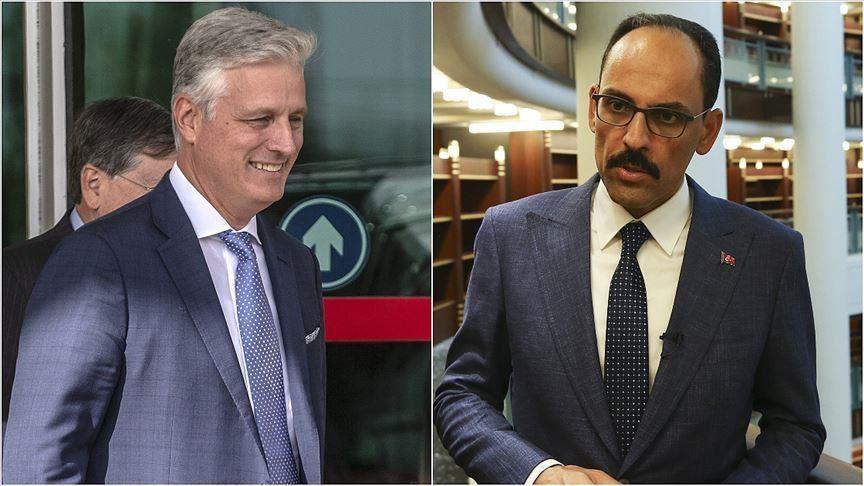
Senior Turkish and U.S. officials on Oct. 26 discussed bilateral ties over the phone, as well as the conflict between Azerbaijan and Armenia, and recent attacks by the Syrian regime on the country's last rebel stronghold.
Emphasizing the importance of seeking a diplomatic solution to the dispute between Baku and Yerevan on the region of Upper Karabakh, Turkey's presidential spokesman İbrahim Kalın told U.S. national security adviser Robert O'Brien that cease-fire violations by Armenia and its attacks on civilian populations were unacceptable and contrary to international law, according to a statement by the presidential office.
Kalın reiterated Turkey's position that in order for there to be a permanent and sustainable solution, Armenia must withdraw completely from the territories occupied in and around Upper Karabakh, also known as Nagorno-Karabakh, that are internationally recognized as Azerbaijani territory.
He also noted that the international community should take concrete steps to ensure the territorial integrity of Azerbaijan under the decisions of the U.N. Security Council and the Organization for Security and Cooperation in Europe (OSCE).
Though Azerbaijan agreed to a fresh humanitarian cease-fire to exchange prisoners and bodies, Armenian forces broke the truce only minutes after it was supposed to take effect, the Azerbaijani leader said Monday, marking the third such truce broken by Armenia in less than a month.
Syria
Expressing concern on increasing attacks by the Syria's Bashar al-Assad regime and its supporters on the war-torn country's northeastern Idlib region, Kalın said that to prevent fresh crises from erupting, the latest truce reached on March 5 should be preserved and the political resolution process supported through ongoing efforts to draw up a new constitution.
On March 5, Turkish President Recep Tayyip Erdoğan and Russia’s Vladimir Putin announced that they had reached a cease-fire agreement in Idlib between the opposing rebel and regime forces.
Several people were reportedly killed in a Russian airstrike on the Al-Sham Legion of the Syrian National Army in Idlib province on Monday, according to opposition sources.
In May 2017, Turkey, Russia and Iran announced that they had reached an agreement to establish a de-escalation zone in Idlib, as part of the Astana talks on Syria.
Despite subsequent understandings that were concluded for the cease-fire in Idlib, the regime forces and their allies continued their attacks on the region.
Since January 2019, the attacks have killed more than 1,800 civilians and displaced more than 1.94 million people who fled to relatively calm areas or close to the Turkish border.
Turkey calls on Minsk Group to hold talks on Karabakh
Turkey on Oct. 26 called on the co-chairs of the Minsk Group to start a results-oriented negotiation process aiming at a permanent solution of the conflict between Armenia and Azerbaijan on the Upper Karabakh region.
Turkish Foreign Ministry spokesman Hami Aksoy said in a statement that for the efforts of the Minsk Group to yield concrete results, it would be necessary to take into account recent cease-fire violations by Armenia and to launch such talks in line with U.N. Security Council resolutions on the issue and international law.
The Organization for Security and Co-operation in Europe (OSCE) Minsk Group - co-chaired by France, Russia, and the U.S. - was formed in 1992 to find a peaceful solution to the conflict, but to no avail.
Aksoy noted that Yerevan had violated three cease-fires - one on Oct. 10, another on Oct. 18 and the latest going into effect on Monday morning - after the clashes erupted following Armenia's attack on Azerbaijan.
He said that the latest truce had been declared to allow the exchange of prisoners of war and bodies as a result of the initiatives of the U.S., but was violated again "in minutes" by Armenia as it continued its attacks on Azerbaijani positions on the front line and civilian targets in Azerbaijan's inner regions far from the conflict zone
On Sunday, the U.S. State Department said Deputy Secretary of State Stephen Biegun met with Armenian Foreign Minister Zohrab Mnatsakanyan and Azerbaijani Foreign Minister Jeyhun Bayramov.
However, Armenia broke the truce only minutes after it was supposed to take effect on Monday, Azerbaijan’s President Ilham Aliyev said.